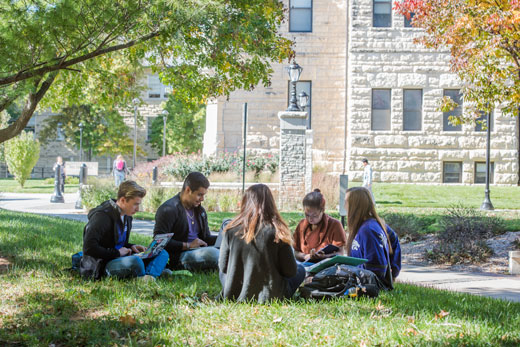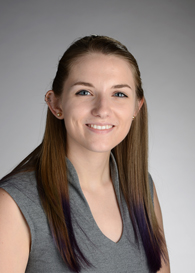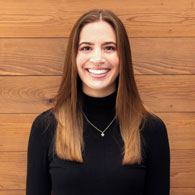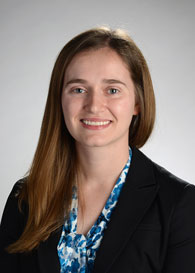05/22/19
K-State Current - May 22, 2019
K-State Current is a weekly news update for the Kansas Board of Regents to apprise the Regents on a few of the many successes and achievements made by K-State faculty, staff and students.

K-State News
Health needs identified in Kansas communities
 In the far northeast reaches of Kansas, mental health resources are few and far between. That’s more important than ever in rural counties where a sluggish farm economy and its spillover effects have taken a toll.
In the far northeast reaches of Kansas, mental health resources are few and far between. That’s more important than ever in rural counties where a sluggish farm economy and its spillover effects have taken a toll.
To reach as many people as possible with mental health resources, K-State Research and Extension’s Doniphan County team is planning three “Mental Health First Aid” training sessions, including one specifically for those working with youth, said Kathy Tharman, director of the Doniphan County office. Two other classes for adults will be open to the public.
The effort got a boost from a K-State Research and Extension Culture of Health grant that will help buy textbooks and other materials for the training, Tharman said.
That grant was one of 32 provided to extension offices in Kansas to support mental and physical health initiatives across the state. In total, $170,000 in grants were awarded in 2018.
Working with Kansans across the state to improve mental and physical health is the plan behind a K-State Research and Extension effort called the Culture of Health. The goal, part of a nationwide effort, is for extension to do for mental and physical health what extension has done for agriculture for years.
Extension offices across the state have always offered classes and resources aimed at educating the public about how to live healthier lives. The Culture of Health initiative, however, sharpened the focus and is providing extension agents with more tools to support mental and physical health programs. To create an environment with more opportunity to practice healthy behaviors, community involvement is emphasized.
The initiative kicked off in 2018 when K-State Research and Extension brought together 250 representatives of health departments, health coalitions and other stakeholders with extension staff in seven locations around Kansas to identify existing resources and challenges. Among the most significant concerns were obesity, diabetes, cancer, heart disease, addictions, farm stress, suicides, and access to health care and healthy foods.
“Mental health was a common thread across the state,” said Paula Peters, associate director of extension programs. “While our extension staff may not be equipped to deal directly with many of those issues, we are good at bringing people together to learn how best to address them and in guiding people to places where they can get help. Many local units, like Doniphan County, are doing just that.”
Awarding grants to local extension offices to address some of the most pressing needs in communities was the next step. Funding was awarded for a range of projects, including activities promoting gardening in a community where healthy recreation needs were identified; improving access to healthy foods in areas considered to be ‘food deserts;’ building a walking trail in a community where outdoor recreation options were limited; and educating a community about how a co-op grocery store model can benefit citizens.
Back in Doniphan County, Tharman noted that the county health department and KANZA Mental Health, a regional not-for-profit center based in Hiawatha, work to meet the public’s needs.
“As a committee, however, we recognized that rarely are there training opportunities for this subject that are open to public, concerned citizens,” she said.
“There has been a lot of talk on farming stress lately,” Tharman added. “However, this audience is a fairly closed group – not overly receptive to public health trainings. Our goal is to be proactive in this area so as to benefit all of our community citizens.”
When learning of the grant funding opportunity, Tristen Cope, a family and consumer sciences extension agent in Marion County, worked with volunteers from her community who make up a program development committee, to identify areas where funding could make an impact.
In Marion County, more than 22% of the 12,112 residents are 65 years of age and older. Cope said some of the barriers to creating change and building a healthy community for them include chronic diseases, limited primary care physicians, lack of insurance, and lack of public transportation and long commutes.
Her committee determined that the Stay Strong, Stay Healthy extension program would address many of those barriers to good health.
“As part of our efforts, we are encouraging our county health-care providers to refer their clients and patients to the Stay Strong, Stay Healthy program,” Cope said. “The Culture of Health grant will help to purchase the recommended materials and supplies needed to conduct the program."
Kansas State University tabbed as role model for first-gen student success

Kansas State University is among nine institutions that will lead others in developing programs nationally that help first-generation college students succeed.
The Center for First-generation Student Success, an initiative of the Student Affairs Administrators in Higher Education, or NASPA, and The Suder Foundation, has invited Kansas State University to serve on its inaugural First Forward advisory board. The board will help the other 80 inaugural First Forward cohort universities across the nation improve experiences and advance outcomes for first-generation students.
Institutions may apply for the First Forward designation. After two years in the program, they may apply to serve on the advisory board, where they mentor other institutions and facilitate discussions about best practices regarding first-generation student success. Kansas State University was selected to be among the inaugural advisory board because of its many successful existing programs.
"Through the application process, it was evident that K-State is not only taking steps to serve first-generation students but is prepared to make a long-term commitment and employ strategies for significant scaling and important advances in the future," said Sarah E. Whitley, senior director of the Center for First-generation Student Success.
The university opened its Office for First-generation Students in June 2018 to support students who do not have any college graduates in their family. The office connects those students to campus resources and coordinates university efforts to foster a first-generation community of peers and faculty.
"Regardless of their background, all students should have the opportunity to seek an education and develop the skills to have a successful career," said Charles Taber, provost and executive vice president. "Helping first-generation students navigate the college process successfully is at the heart of what K-Staters do as the nation's first operational land-grant university."
The university also launched the initiative, Improving the Graduation and Persistence Rates of First-Generation Students, to become a national model for all first-generation student success. The initiative has helped build a mentoring network, increase the number of students enrolled in learning communities, developed recruitment materials for first-generation students and identified entry-level classes that help with retention and student engagement.
"We want to be the university of choice for first-generation students in Kansas and beyond," said Stephanie Bannister, assistant vice president for student life. "As part of the First Forward initiative with NASPA, K-State will work with peer institutions across the country to develop programs and become a national leader for first-generation student success."
The First Forward Institution designation will give faculty and staff access to professional development opportunities, community-building experiences and the center's research and resources. One of the benefits now available to K-Staters is the opportunity to attend the First Forward Workshop on June 15 in Orlando. These opportunities are provided to further strengthen university efforts that ultimately help first-generation students at Kansas State University and nationwide.
K-State Faculty Highlights
Prasad elected to lead international crop science organization
P.V. Vara Prasad, Kansas State University Distinguished Professor in the Department of Agronomy and director of Feed the Future Innovation Lab for Collaborative Research on Sustainable Intensification, has been elected to lead the Crop Science Society of America. This is a three-year commitment, and he will serve as the society’s president-elect in 2020, president in 2021 and past president in 2022.
Prasad is the first K-State faculty member elected to serve as the president of the CSSA.
The Crop Science Society of America is a professional international society which fosters the mission of plant science for a better world. Based in Madison, Wisconsin, and founded in 1956, the CSSA has more than 5,000 members dedicated to advancing the field of crop science through research, teaching and extension activities.
The society has nine divisions, including crop breeding and genetics, crop physiology and metabolism, seed physiology, production and technology, turfgrass science, genomics and biotechnology. The CSSA also collaborates with its sister organizations, the American Society of Agronomy and the Soil Science Society of America – with a collective membership of more than 12,000 individuals around the world contributing to advancement of crop science, agronomy and soil science.
“My vision for the CSSA would be to promote crop science as the foundation for agriculture as it provides nutritious, healthy, safe food for humans and animals,” Prasad said. “We can accomplish this vision by working together as a team to promote scientific innovation, outreach and increased funding for research, education and extension. We also need to work on leveraging resources, encouraging international cooperation, enhancing diversity, communicating strategically, and promoting science for effective public policy.”
Prasad said strategic messaging to attract young people including high school students, undergraduate and graduate students, in crop sciences is critical for the sustainability of the CSSA and the creation of the next generation of scholars to address the challenge of enhancing crop productivity, ensuring global food and nutritional security. He noted the active and efficient use of communication tools, including social media engagement and website management, is required in order to connect with a wider audience.
“It is a great honor for the Department of Agronomy and the College of Agriculture to have one of our distinguished faculty leading the largest scientific organization of crop scientists in the world,” said Ernie Minton, interim dean of the College of Agriculture and director of K-State Research and Extension.
Nina Lilja, associate dean of international agriculture, added, "We are excited by this recognition of Vara Prasad, indicating how he has made an impact in the crop science profession. I cannot think of anyone more suitable and experienced to lead the CSSA, and we look forward to seeing many accomplishments during his tenure.”
Chuck Rice, University Distinguished Professor and former president of Soil Science Society of America, said, “The position comes with many responsibilities, but it also provides an opportunity to contribute to the profession and serve the membership, as well as enhancing your leadership skills and ability to influence policy and research, extension and teaching goals.”
Prasad is recognized internationally for his research on understanding the responses of food grain crops to changing environments (temperature and water) and developing best management practices for the efficient use of inputs using systems approaches. He is passionate about international agriculture and capacity building of graduate students, scholars and institutions.
He has ongoing research, education and extension activities in several countries in Africa and Asia. He has published more than 220 peer reviewed journal articles and book chapters, with his research being cited over 9300 times. He has been instrumental in obtaining more than $70 million in grants and gifts for K-State programs and he has trained more than 100 international research scholars and graduate students from 23 countries. In addition, he has been invited and has traveled to give presentations in approximately 40 countries around the globe and served as a member of the editorial boards of nine different international journals.
Prasad has also received several competitive awards and recognitions for his research, education, extension, service, and leadership activities. These include the Early Career Award, the Outstanding Research Award, and the Distinguished Faculty Award from Gamma Sigma Delta, the Outstanding Scientist Award from Sigma Xi, the Excellence in Graduate Teaching Award from the College of Agriculture, the International Educator Award from the Office of the International Programs, the Distinguished Graduate Faculty Award from Commerce Bank and W.T. Kemper Foundation, the Dr. Ron and Rae Iman Outstanding Faculty Award from Kansas State University, and the Irvin E. Young Award in Applied Sciences from Higuchi Research Endowment at the University of Kansas.
He is an elected fellow of the Crop Science Society of America, the American Society of Agronomy, and the American Association for the Advancement of Sciences. Being chosen as a Fellow is the highest honor recognized by these professional societies.
Prasad joined K-State as an Assistant Professor in the Department of Agronomy in 2005 and was promoted to Associate Professor in 2009 and to Professor in 2013. He served as the Director of the Center for Sorghum Improvement at K-State from 2009 to 2016 and he was named a University Distinguished Professor in 2016. Prasad received his bachelor of science degree in 1991 and master of science degree in 1993 from Andhra Pradesh Agricultural University in India and his PhD in 1999 from The University of Reading in the United Kingdom. After completing of his doctoral degree, he worked at the University of Florida as Postdoctoral Research Fellow before coming to K-State.
K-State Student News
Three undergraduate researchers selected as Goldwater scholars
Three Kansas State University undergraduate student researchers are among the 2019 national Barry M. Goldwater scholars.
Erianna Basgall, junior in biochemistry, Ellis; Mackenzie Thornton, junior in microbiology and pre-medicine, Leawood; and Gabrielle Phillips, senior in chemical engineering, Wichita; have received the prestigious Goldwater scholarship.
Established by Congress in 1986 to honor Sen. Barry M. Goldwater from Arizona, the Goldwater scholarship is the premier undergraduate scholarship for students interested in research careers in engineering, mathematics or the natural sciences. Awardees receive up to $7,500 annually for college-related expenses. For the 2019-2020 academic year, it was awarded to nearly 500 students across the nation. With 77 Goldwater scholars to date, Kansas State University ranks among the nation's top 10 universities for producing Goldwater scholars.
Mentored by Greg Finnigan, assistant professor of biochemistry and molecular biophysics, Basgall is working with CRISPR gene editing and developing applications to work with the technology. She has co-authored two peer-reviewed publications about CRISPR technology. 
Basgall is a member of the University Honors Program, a master alchemist for the Beta Rho chapter of Alpha Chi Sigma co-ed professional chemistry fraternity, and is a student affiliate of the American Chemical Society. In addition to the Goldwater scholarship, she has received a Kansas-IDeA Network of Biomedical Research Excellence Star Trainee award. A 2016 graduate of Ellis High School, Basgall is the daughter of Jason Basgall, Ransom, and Noël Servais-Leach, Ellis.
Mentored by Katsura Asano, professor of biology, Thornton is researching regulation of translation in cancer cells. She also has worked in the otolaryngology department at the University of Kansas Medical Center, researching head and neck cancer.
Thornton, a university semester honors list student, is the membership chair of Kappa Kappa Gamma sorority and a member of Cancer Journal Club. In addition to the Goldwater scholarship, she has received a Cancer Research Award and a Kansas-IDeA Network of Biomedical Research scholarship, been named a Kansas-IDeA Network of Biomedical Research Star Trainee, and was a part of the University Kansas Cancer Center Summer Student Research Training Program. A 2016 graduate of Blue Valley North High School in Overland Park, Thornton is the daughter of Parker and Gina Thornton, Leawood.
In addition to the Goldwater scholarship, she has received a Cancer Research Award and a Kansas-IDeA Network of Biomedical Research scholarship, been named a Kansas-IDeA Network of Biomedical Research Star Trainee, and was a part of the University Kansas Cancer Center Summer Student Research Training Program. A 2016 graduate of Blue Valley North High School in Overland Park, Thornton is the daughter of Parker and Gina Thornton, Leawood.
Mentored by Ruth Welti, university distinguished professor of biology, Phillips researches and characterizes plant genes at the Kansas Lipidomics Research Center. She also has worked with Kathrin Schrick, associate professor of biology, as part of her research of plant molecular biology. In summer 2017, Phillips interned at the Institute of Bioprocess Engineering at Technische Universitat Kaiserslautern, where she worked to increase the efficiency of pharmaceutical production of plant cell lines. In 2016, Philips helped program a virtual reality headset to better understand the neural pathway of balance reflexes with Nils Hakansson at the Human Biomechanics Design Lab at Wichita State University.
She also has worked with Kathrin Schrick, associate professor of biology, as part of her research of plant molecular biology. In summer 2017, Phillips interned at the Institute of Bioprocess Engineering at Technische Universitat Kaiserslautern, where she worked to increase the efficiency of pharmaceutical production of plant cell lines. In 2016, Philips helped program a virtual reality headset to better understand the neural pathway of balance reflexes with Nils Hakansson at the Human Biomechanics Design Lab at Wichita State University.
Phillips is a member of the University Honors Program, Tau Beta Pi engineering honor society, Engineering in Medicine and Biology Society, American Red Cross Club, Steel Ring and Mortar Board. In addition to the Goldwater scholarship, she has received many research scholarships, including a Kansas-IDeA Network of Biomedical Research Excellence Star Trainee award, Office of Undergraduate Research & Creative Inquiry Research Grant, Kansas-IDeA Network of Biomedical Research Excellence Campus Scholarship and a Johnson Cancer Research Center Undergraduate Research Award. She also was awarded a research internship in science and engineering from the German Academic Exchange Service. She is a recipient of the Putnam Scholarship and Fred and Mary Koch Foundation Scholarship. A 2015 graduate of Trinity Academy in Wichita, Phillips is the daughter of Matthew and Daphne Phillips, Andover.
Deep-dive learning: Submarine built with help of Kansas State Polytechnic students to be unveiled
 One of the deepest-diving, privately owned submarines in the world will be unveiled Saturday, June 1, in Salina — and it was built with the help of Kansas State University Polytechnic Campus students.
One of the deepest-diving, privately owned submarines in the world will be unveiled Saturday, June 1, in Salina — and it was built with the help of Kansas State University Polytechnic Campus students.
The Pisces VI is a three-person capacity submarine, able to dive to an operational depth of 7,155 feet and support a minimum of 140 hours underwater with a mission length of up to 14 hours.
The public unveiling of the Pisces VI submarine will be at 1 p.m. Saturday, June 1, in Hangar 509 at the Salina Regional Airport.
Pisces VI, which is owned by Scott Waters, Salina, partnered with Kansas State Polytechnic to involve students in the building process, furthering the campus's hands-on education style. Students assisted in various aspects of the project, from technical, manual procedural documentation to a slurp gun device fitted specially for the Pisces VI submarine.
"Working with Kansas State Polytechnic has been amazing," Waters said. "The ability to have students working on this project with us has been very helpful, and the students have been able to gain real-world knowledge and apply the skills they're learning.
"I'm most excited knowing that the students will be able to put this project on their resumes and allow them to stand out with employers," Waters said. "Kansas State Polytechnic shows how important their students' futures are to them by being so proactive. I look forward to this long-term partnership and the impact we're able to have on students."
The slurp gun is a device, created by a Kansas State Polytechnic sophomore, allows the submarine to take specimen samples while deep below the surface and transport those samples safely and securely back to study. The device essentially operates like an underwater vacuum, operated from inside the submarine, and stores samples in a holding tank until the submarine again reaches the surface.
The submarine will be available for hire for scientists, filmmakers and high adventure tourists. It is designed to fit into a shipping container, providing for inexpensive travel around the world. Its first expedition after sea training is in December.
"This has been a fantastic opportunity for our students to be involved with something really significant," said Kurt Barnhart, associate dean of research at Kansas State Polytechnic. "It's hard to overstate the potential impact of this project has had as Pisces VI partners with explorers around the globe to push the boundaries of deep-sea exploration."
The Pisces VI company mission is to explore, educate and inform about the deep ocean — what Waters refers to as the "last remaining unexplored frontier on the planet." Walter believes the oceans are a valuable shared resource and expanding knowledge is essential. He says his company wants to discover new life, educate the youth of the world on the importance of STEM education, and aid in preserving oceans.
Waters said he has always had an interest in exploration and entrepreneurship. He built his first hobby submarine in 2007, a 350-foot-diving, two-person submarine. That sparked interest in a deep-diving submarine, and after years of searching, he found the Pisces VI.
For information on the public unveiling, visit polytechnic.k-state.edu/piscesunveiling. For information on the Pisces VI company, visit piscessub.com.